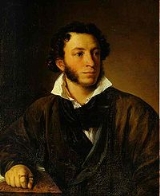
author of the Romantic
era who is considered by many to be the greatest Russian poet and the founder of modern Russian literature
.
According to Vladimir Nabokov
,
Pushkin's idiomIdiomIdiom is an expression, word, or phrase that has a figurative meaning that is comprehended in regard to a common use of that expression that is separate from the literal meaning or definition of the words of which it is made...
combined all the contemporaneous elements of Russian with all he had learned from Derzhavin, ZhukovskyVasily ZhukovskyVasily Andreyevich Zhukovsky was the foremost Russian poet of the 1810s and a leading figure in Russian literature in the first half of the 19th century...
, BatyushkovKonstantin BatyushkovKonstantin Nikolayevich Batyushkov was a Russian poet, essayist and translator of the Romantic era.-Biography:The early years of Konstantin Batyushkov's life are difficult to reconstruct...
, Karamzin, and KrylovIvan KrylovIvan Andreyevich Krylov is Russia's best known fabulist. While many of his earlier fables were loosely based on Aesop and Jean de La Fontaine, later fables were original work, often satirizing the incompetent bureaucracy that was stifling social progress in his time.-Life:Ivan Krylov was born in...
; these elements are: 1. The poetical and metaphysicalMetaphysicalMetaphysical may refer to:*Metaphysics, a branch of philosophy dealing with aspects of existence and the theory of knowledge*The supernatural...
strain that still lived in Church Slavonic forms and locutions; 2.
Upon the brink of the wild stream He stood, and dreamt a mighty dream.![]()
And thus He mused: "From here, indeedShall we strike terror in the Swede?And here a city by our laborFounded, shall gall our haughty neighbor;"Here cut" - so Nature gives command -Your window through on Europe; standFirm-footed by the sea, unchanging!![]()
‘Tis time, my friend, ‘tis time!For rest the heart is aching;Days follow days in flight, and every day is takingFragments of being, while together you and IMake plans to live. Look, all is dust, and we shall die.![]()
But, as it is, this pied collectionbegs your indulgence — it's been spunfrom threads both sad and humoristic,themes popular or idealistic,products of carefree hours, of fun,of sleeplessness, faint inspirations,of powers unripe, or on the wane,of reason's icy intimations,and records of a heart in pain.![]()
There yet remains but one concluding tale,And then this chronicle of mine is ended—Fulfilled, the duty God ordained to me,A sinner. Not without purpose did the LordPut me to witness much for many yearsAnd educate me in the love of books.One day some indefatigable monkWill find my conscientious, unsigned work;Like me, he will light up his ikon-lampAnd, shaking from the scroll the age-old dust,He will transcribe these tales in all their truth.![]()
Unforced, as conversation passed,he had the talent of salutingfelicitously every theme,of listening like a judge-supremewhile serious topics were disputing,or, with an epigram-surprise,of kindling smiles in ladies' eyes.![]()
Always contented with his life,and with his dinner, and his wife.![]()
A man who's active and incisivecan yet keep nail-care much in mind:why fight what's known to be decisive?custom is despot of mankind.![]()
The illness with which he'd been smittenshould have been analysed when caught,something like spleen, that scourge of Britain,or Russia's chondria, for short.![]()

